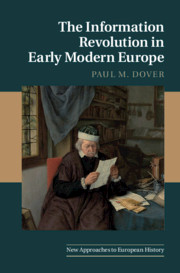Book contents
- The Information Revolution in Early Modern Europe
- New Approaches to European History
- The Information Revolution in Early Modern Europe
- Copyright page
- Dedication
- Contents
- Figures
- Acknowledgments
- 1 Introduction
- 2 European Paper
- 3 “Ink-Stained Fingers”
- 4 The Paper of Politics and the Politics of Paper
- 5 Revolutionary Print
- 6 The Book of Nature and the Books of Man
- 7 Writing Others and the Self
- 8 Conclusion
- Bibliography
- Index
1 - Introduction
Worlds of Paper
Published online by Cambridge University Press: 24 September 2021
- The Information Revolution in Early Modern Europe
- New Approaches to European History
- The Information Revolution in Early Modern Europe
- Copyright page
- Dedication
- Contents
- Figures
- Acknowledgments
- 1 Introduction
- 2 European Paper
- 3 “Ink-Stained Fingers”
- 4 The Paper of Politics and the Politics of Paper
- 5 Revolutionary Print
- 6 The Book of Nature and the Books of Man
- 7 Writing Others and the Self
- 8 Conclusion
- Bibliography
- Index
Summary
“The fear of obliteration obsessed the societies of early modern Europe,” Roger Chartier writes in Inscription and Erasure. “To quell their anxiety, they preserved in writing traces of the past, remembrances of the dead, the glory of the living, and texts of all kinds that were not supposed to disappear.” The efforts they made to confront this anxiety, however, paradoxically generated a new, related anxiety: the urge to preserve, record, and ward off obliteration frequently led to an unmanageable accumulation of texts, records, and ephemera of wildly varying utility and quality. Most of this was paper, which was not a new technology in early modern Europe but one whose use proliferated and diversified in these centuries. Paper, as never before, became the transactional medium; the repository of personal, communal, and institutional memory; the avenue of communication; the lifeblood of bureaucracies; and the foundation and residue of learning. Early modern Europeans, whether or not they sought to, and whether or not they were pleased with or trusted the new reality, put paper inscribed with text at the center of their lives.
- Type
- Chapter
- Information
- The Information Revolution in Early Modern Europe , pp. 1 - 37Publisher: Cambridge University PressPrint publication year: 2021

